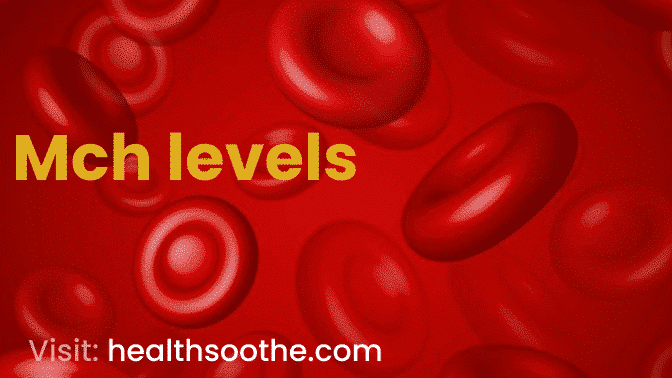Your blood is red because of the protein called haemoglobin. It transfers oxygen out of your lungs and into other bodily regions. It also aids in the removal of carbon dioxide from your body.
The average quantity of haemoglobin found in one of your red blood cells is known as mean corpuscular haemoglobin or MCH. It is distinct from MCHC. Your “mean corpuscular haemoglobin concentration” is that value. It’s a different way to test haemoglobin that accounts for the size of your red blood cells. The mean corpuscular volume represents the cells’ average size (MCV).
It’s natural to be concerned if your MCH levels are abnormal. To figure out what’s going on, though, your doctor will need more testing. A blood smear may be performed by a lab technician. This implies that the technician uses a microscope to examine your blood. To determine if you are getting enough iron, folate, and vitamin B12, your doctor will likely do a blood test.
MCH that is too high or low might raise suspicion. However, the doctor may take action to resolve the problems after she figures out what’s going on. If your doctor informs you that your MCH is either greater or lower than it should be, the following information will help you understand what will happen.
What Are Normal MCH Levels?
Why Test MCH Levels?
A component of the complete blood count is the MCH test (CBC). These tests provide information on the condition of your blood cells. A CBC could be performed as part of your annual physical. Or, if you exhibit signs of certain medical conditions, your doctor could prescribe one.
If you exhibit symptoms of anaemia or certain nutritional deficits, the doctor may do a thorough examination of MCH along with MCV and MCHC.
A complete blood count (CBC) panel measures your MCH level. In order to check for a wide variety of disorders, such as anaemia and infection, your doctor will request a CBC panel. The CBC analyses platelets, red blood cells, and white blood cells. Utilizing a red blood cell examination, MCH is determined.
The amount of haemoglobin in a certain volume of blood is divided by the number of red blood cells to arrive at MCH.
Low MCH causes and symptoms
Low MCH is defined as an MCH value determined below 27.5 pg. This indicates that there is little haemoglobin per red blood cell.
Usually, iron deficiency anaemia is seen when the MCH value is low. Haemoglobin is made with the help of iron. To make haemoglobin, your body takes a tiny quantity of iron from your diet.
A diet low in iron, significant surgery or trauma, blood loss, or consuming a diet low in iron is a few of the common reasons for iron deficiency.
Thalassemia, a hereditary disease, may sometimes be the root cause of low MCH. Haemoglobin can only produce so much of this situation. This indicates that fewer red blood cells are moving around in your circulation.
Symptoms
The following symptoms might occur if your MCH value is low:
- shortness of breath
- Chest pain
- fast heartbeat
- fatigue or weakness
- very pale or yellowish skin
- Headache
Shortness of breath
Breathing difficulties are characterised by discomfort when breathing and a sense of not being able to take full breath. This could appear quickly or gradually. This excludes mild respiratory issues like exhaustion after an aerobics lesson.
There are several disorders that may impair breathing. Additionally, stress and worry might cause them to manifest.
A major health condition that requires medical treatment may be indicated by recurrent bouts of shortness of breath or abrupt, acute breathing problems. Any respiratory issues you may have should be discussed with your doctor.
Chest pain
One of the most frequent causes of emergency department visits is chest discomfort (ER). Each individual experiences chest discomfort differently. It differs as well in the:
- quality
- intensity
- duration
- Location
It could seem like a mild ache or a severe, searing pain. It might indicate a major cardiac condition or be the result of a less serious, common reason.
What causes chest pain?
Your first assumption while experiencing chest discomfort can be that you are suffering a heart attack. Although chest discomfort is a recognised indicator of a heart attack, there are numerous other less dangerous diseases that may also cause it.
Only 5.5% of all ER visits for chest discomfort, according to one research, result in the identification of a significant cardiac condition.
Fatigue or weakness
A generalised sense of exhaustion or lack of energy is referred to as fatigue. It differs from just feeling tired or drowsy. You lack both energy and motivation when you are exhausted. Sleepiness may be a sign of exhaustion, but the two are not the same.
Numerous medical disorders, ranging in severity from moderate to severe, often exhibit fatigue as a symptom. It also happens naturally as a consequence of certain lifestyle decisions, including not exercising or eating poorly.
Consult your doctor if your weariness doesn’t go away with enough rest and nourishment or if you think it could be brought on by a physical or mental health problem. They can work with you to identify the root of your exhaustion and address it.
What causes fatigue?
Fatigue may have a variety of reasons. They may be categorised into three broad groups:
- lifestyle factors
- physical health conditions
- mental health issues
If you have anaemia that’s due to B-12 deficiency, you may also experience:
- tingling or “pins and needles” in your hands or feet
- nausea or vomiting
- bloating and gas
- mental symptoms, such as depression or confusion
In addition to anaemia brought on by a folate shortage, you could also encounter the following signs and symptoms:
- diarrhoea
- decrease in appetite
- irritability
- a smooth or sensitive tongue
Treatment for low or high MCH
Low MCH
Iron-rich diets (there are even vegetarian alternatives) and iron supplements may be used as treatments for low MCH brought on by iron deficiency.
You could need a blood transfusion in very uncommon circumstances, such as when symptoms are severe or blood loss has happened.
Treatment may not be necessary for those with moderate thalassemia. However, if your symptoms are severe, blood transfusions can be necessary.
High MCH
Changes in lifestyle, such as increasing your intake of foods high in vitamin B-12 and folate, are often used to cure anaemias brought on by B-12 or folate deficiencies.
To further increase your levels of B-12 and folate, your doctor may additionally advise taking supplements of these vitamins, or if absorption is an issue, B-12 injections.
Conclusion:
The prognosis for individuals with aberrant MCH readings depends on the underlying illness.
Iron deficiency anaemia is a common cause of low MCH levels. Typically, lifestyle modifications such as eating foods high in iron and supplementing with iron may be used to manage this disease.
If your symptoms are severe and your low MCH value is caused by thalassemia, which is unusual, you could need blood transfusions.
Treatment for high MCH levels brought on by a vitamin B-12 or folate shortage often involves dietary adjustments, dietary supplements, or injectable B-12.
Be careful to discuss your MCH findings with your doctor if you have any concerns. You may choose the best course of action together.




